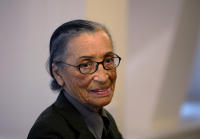National Park Service ranger Betty Reid Soskin was not a 'Rosie'
By Angela Hill
Oakland Tribune
Posted: 02/15/2011 12:00:00 AM PST
Updated: 02/15/2011 07:21:32 AM PST
National Park Ranger and Community Outreach Specialist Betty Reid Soskin speaks about World War...

OAKLAND -- In her leaf-green National Park Service uniform, her posture that of a young military cadet, 89-year-old Betty Reid Soskin regaled students and staff at Oakland's Samuel Merritt University last week with another side of World War II history. The black side. Her side.
"I have now lived long enough to be black history," she quipped to a rumble of chuckles Wednesday during a Black History Month event at the medical university, where she shared her background as the great-granddaughter of a slave, a worker in the Kaiser shipyards during the war, and currently a ranger and tour guide at the Rosie the Riveter/World War II Home Front National Historical Park in Richmond.
"Her family were pioneers in the Bay Area," said Diane Hansen, SMU's director of academic and disability support services, who introduced Soskin's speech. "She has witnessed so many changes in our society."
Soskin is the oldest active ranger in the park service and is the author of, "Of Lost Conversations and Untold Stories," bringing to light many tales of the second World War that eluded the school books.
"The real story of what we accomplished on the home front is so much more powerful than the myths we created about that period," she told the group. "I never considered myself a 'Rosie' (the iconic white female shipyard worker). I spent those years working in an all-black Jim Crow union hall for the shipyard boilermakers. Rosie was a white woman's story."
While many American men were at war in Europe and the Pacific, laborers were in high demand at home to build warships and airplanes. Here in the Bay Area, industrialist Henry Kaiser recruited thousands of white women to work at his shipyards in Richmond, then mined the Southern states for manpower to help the Rosies with the heavy lifting, Soskin said. Eventually, black women would also join that work force.
Not only did this swell the population of Richmond from a few thousand to more than 100,000, it "brought these workers to the Bay Area, which included the entire system of segregation as it existed in the South -- sharecroppers of both races who did not share drinking fountains or schools or public accommodations," Soskin said.
"The goal was not diversity, however," she said. "The goal was to build ships. To build them faster than the enemy could sink them. So we had to work it through. And that motley crew of extraordinary ordinary people built 747 ships in three years and eight months. This feat has never been matched. It was indeed a time of pride and purpose.
"If we go back and study that period from 1941 to 1945, revisit it with fewer of the blinders of blatant segregation, what we get is a baseline to measure all the social changes that followed," Soskin said. "We see the foundations that set the stage for things like the HMO, the Head Start program, safety in the workplace. This is why the Bay Area is still leading the nation in social change, with the echoes of the 1940s.
"That is a story worth telling," she said.
After the war, Soskin married, had four children, and went on to careers as the proprietor of a record store, a singer and composer, and a community activist. In 1995, she was honored by the California Legislature as the woman of the year.
She was also honored as National Women's History Project's Builders of Communities and Dreams in 2006. And she became a park ranger in 2007.
Two years ago, Soskin sat in the audience at the Lincoln Memorial in Washington, D.C., watching the inauguration of President Barack Obama, a photograph of her great-grandmother tucked in her pocket.
"Through slavery, Reconstruction, lynchings, Jim Crow, Brown vs. the Board of Education and now the first African-American president -- all that happened within the lifetimes of three black women: my great-grandmother, then my mother who was raised by my great-grandmother and now me in my 89th year. Really such a short span of time.
"No one can tell me that change is impossible," she said.

